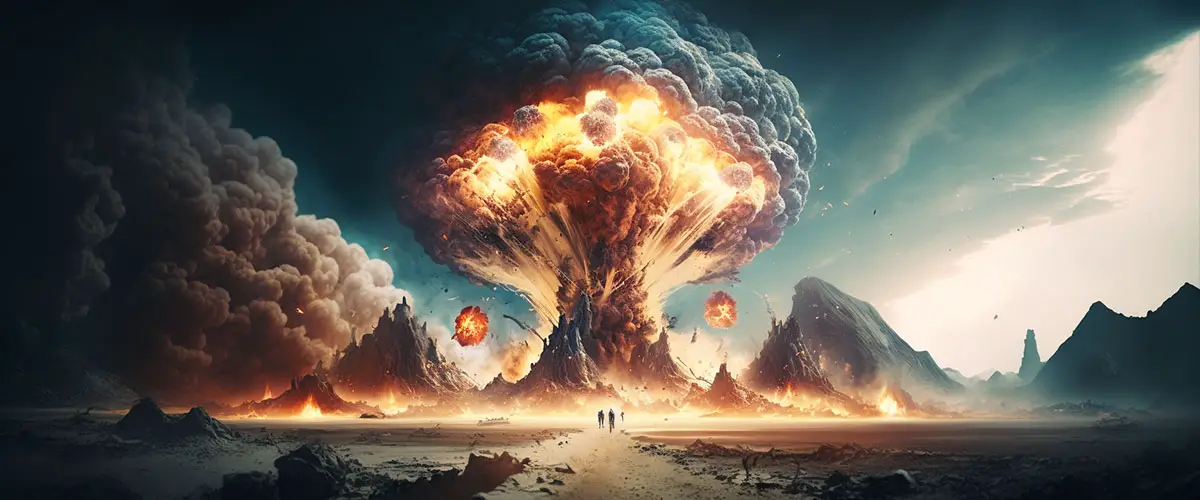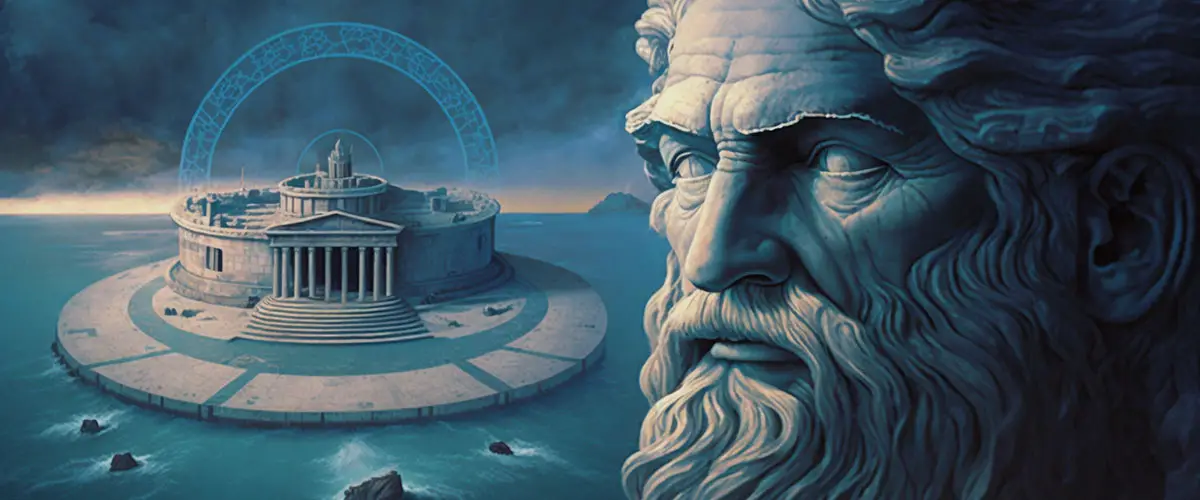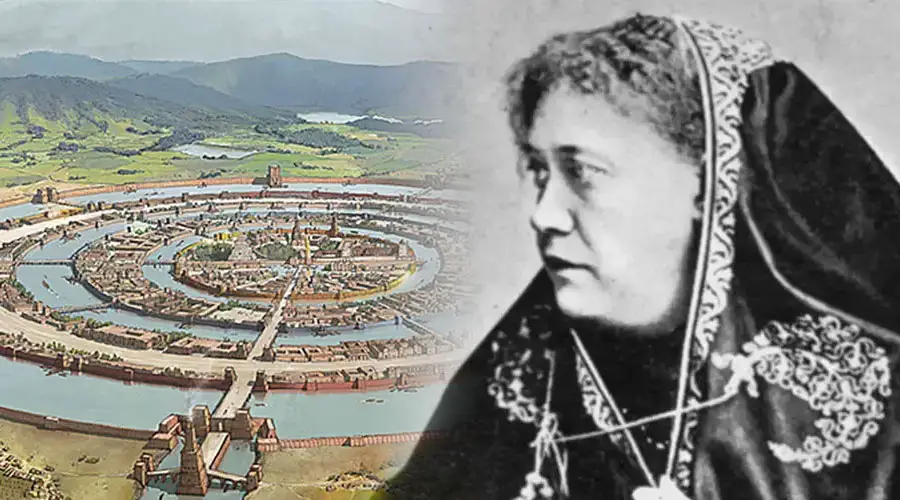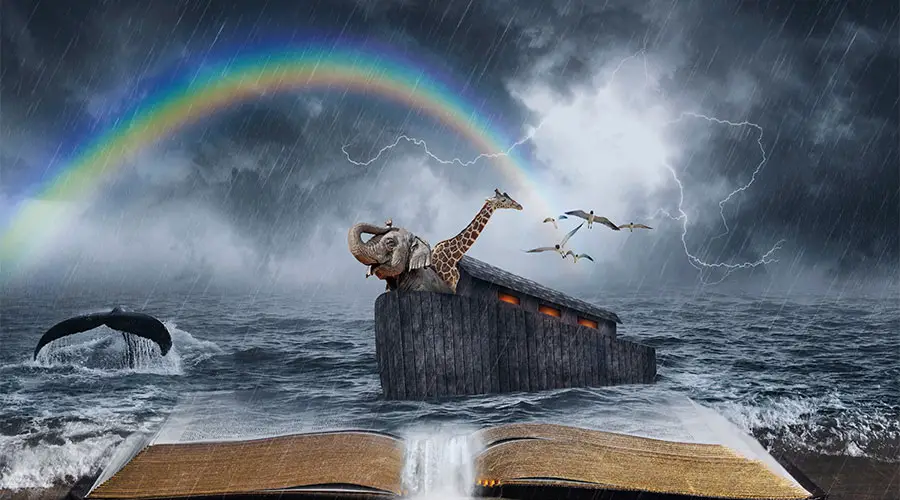The legend of Atlantis has captured the imagination of people for centuries, inspiring countless tales of a lost civilization that was destroyed by a catastrophic event.
Atlantis was destroyed by catastrophic natural events, including earthquakes and volcanic eruptions, which caused the land to sink beneath the ocean. The Atlanteans developed advanced technology while becoming immoral and materialistic, which led to their destruction.
Although the story of Atlantis is often dismissed as a myth, there are several prominent figures in history who have studied and written about the topic in great detail. Among them are Helena Blavatsky, Plato, Graham Hancock, Ignatius Donnelly, and Edgar Cayce, each offering their own unique perspective on the destruction of Atlantis. In this article, we will explore the writings of these scholars and examine their theories about what may have caused the downfall of this fabled civilization.

Plato was the first to officially describe the destruction of Atlantis
Plato was one of the earliest and most influential writers to describe the lost civilization of Atlantis. His account of the destruction of Atlantis is found in his dialogues “Timaeus” and “Critias,” which were written in the fourth century BCE.
According to Plato’s account, Atlantis was a highly advanced civilization that existed around 9,000 years before his time, and was situated on an island beyond the “Pillars of Hercules” (modern-day Strait of Gibraltar). The Atlanteans were said to be a powerful and wealthy people who possessed incredible technologies and knowledge. However, their pride and arrogance eventually led to their downfall. In “Timaeus,” Plato writes:
“For many generations, as long as the divine nature lasted in them, they were obedient to the laws and well-affectioned towards the god, whose seed they were; for they possessed true and in every way great spirits, uniting gentleness with wisdom in the various chances of life, and in their intercourse with one another. They despised everything but virtue, caring little for their present state of life, and thinking lightly of the possession of gold and other property, which seemed only a burden to them.”
Despite their early virtues, the Atlanteans became corrupt and greedy. They expanded their empire by waging war on other societies, including an unsuccessful attempt to conquer Athens. In “Critias,” Plato describes how they became obsessed with power and material wealth, leading them to wage war on neighboring lands and exploit their own natural resources:
“The plain surrounding the city of Atlantis was full of farmers and craftsmen who tilled the land and produced goods for the Atlanteans. They worked hard and were productive, but their labor was exploited by the ruling class. The rich became richer, and the poor became poorer. The Atlanteans also began to develop an insatiable thirst for power, and they soon began to wage war on their neighbors, seeking to expand their territory and control.”
In the end, the Atlanteans’ arrogance and greed brought about their downfall. According to Plato’s account, the Atlanteans were punished by the gods for their immorality, and their civilization was destroyed by earthquakes and volcanic eruptions, causing the island of Atlantis to sink beneath the waves and disappear forever. In “Critias,” Plato describes how the gods punished the Atlanteans for their hubris:
“But in a single day and night of misfortune all your warlike men in a body sank into the earth, and the island of Atlantis in like manner disappeared in the depths of the sea. For which reason the sea in those parts is impassable and impenetrable, because there is a shoal of mud in the way; and this was caused by the subsidence of the island.”

Plato’s account of the destruction of Atlantis has been the subject of much debate and speculation over the centuries. Some scholars have argued that Atlantis was a purely mythical creation of Plato’s imagination, and that he was using it to comment on the what makes the ideal society, not unlike his famous book The Republic. Others have interpreted it to be a description of an actual civilization that existed, and have sought to identify real-world locations that might have inspired his tale.
Regardless of the truth behind Plato’s story, his account of the destruction of Atlantis remains a powerful cautionary tale about the dangers of pride, greed, and corruption. As Plato himself wrote in “Timaeus”:
“And thus, Plato, I have told you all the story of the island of Atlantis, which was once a great and mighty power, whose people were wise and virtuous beyond all others. But in the end, they became corrupt and arrogant, and they paid a terrible price for their hubris. Let this be a warning to all who seek power and wealth at the expense of others.”
Read more about what Plato said about Atlantis here.
The great 19th century mystic Helena Blavatsky described the destruction of Atlantis
Helena Blavatsky was a 19th-century Russian writer, philosopher, and esotericist who is best known for her influential books on spirituality, mysticism, and the occult. She described the destruction of Atlantis in her book “The Secret Doctrine”. Her description involves a cataclysmic event caused by the misuse of technology and spiritual corruption.

Blavatsky acquired her knowledge of ancient history and other dimensions of reality through studying the occult library of her great-grandfather, who was a Russian prince, as well as being guided throughout her life by a group of ascended masters in Tibet, and also her own clairvoyant abilities. According to her, Earth started out as having no life, and then living beings came to earth in a series of seven rounds. It was during the fourth round that the Atlanteans came to earth, and they were the beginning of physical bodies and the separation into two genders. They possessed psychic abilities, as well as advanced technology.
The Atlanteans became corrupted and used their power for selfish purposes, which led to a great conflict within the Atlantean society, with different factions fighting for control of the weapon and its destructive power. The conflict grew so intense that it triggered a series of catastrophic events, including earthquakes, volcanic eruptions, and massive floods.
“The last island of Atlantis submerged about 9,000 years before the time of Solon (about 11,000 years ago), according to Plato; but its disappearance was accomplished by successive inundations and earthquakes, which gradually submerged first the cities and finally the whole continent.”
These natural disasters were so severe that they ultimately caused the entire continent of Atlantis to sink beneath the ocean, wiping out the civilization entirely. The few survivors of the catastrophe were said to have scattered across the globe, carrying with them fragments of the Atlantean knowledge and culture that eventually influenced other civilizations. She described the preservation of Atlantean knowledge and records of its existence:
“A portion of the most ancient records in the secret archives of Tibet were preserved from the destruction of the Alexandrian Library. And a few of the most important fragments thereof are now for the first time made public in this work. One of the said records contains a clear account of the great struggle and the final destruction of the last remnants of the Atlanteans.”
Blavataky’s description of Atlantis is basically consistent with that of Plato, although she described a much longer timeline, with the beginning of Atlantis being millions of years ago, and the destruction happening over 10s of thousands of years, rather than in a single night. You can read more about Helena Blavatsky here.
Edgar Cayce saw the destruction of Atlantis in his famous psychic readings
Edgar Cayce, the renowned American psychic and mystic, is another one of the most influential figures in the history of Atlantis research. Cayce is known for his many psychic readings and visions, which were revealed to him when he would enter a trance state. Among these revelations were details about the lost civilization of Atlantis, including its history, culture, and ultimate demise.
Similar to Blavatsky, Cayce described Atlantis as an advanced civilization that began millions of years ago, and was located in what is now the Atlantic Ocean. They were highly evolved spiritually and technologically, however, despite their many achievements, the people of Atlantis eventually became progressively more corrupt and selfish.
Cayce also described how the misuse of technology had led to a split among the people of Atlantis, with some factions seeking to use their advanced knowledge for peaceful purposes, while others sought to use it for their own selfish ends. Atlantis became split into two groups: the Children of the Law of One, who wanted to return to living in harmony with nature, while the other group, the Sons of Belial, became more and more materialistic, obsessed with technology, and wanted to enslave the lower class of citizens.
The conflict between these groups eventually led to a devastating war, which further weakened the civilization and set the stage for its ultimate destruction. According to Cayce, Atlantis was destroyed in a series of natural disasters, massive earthquakes and volcanic eruptions that triggered a series of catastrophic floods, between 50 000 BC and 10 000 BC, as the civilization broke into smaller islands. The first occurred around 50 000 BC and destroyed their major power source.
Cayce described how the Atlanteans used a crystal called the “Fire Stone” to harness energy from the sun, which was then used to power their advanced technologies. However, he also stated that the Fire Stone could be used as a weapon, capable of unleashing tremendous amounts of energy that could destroy entire cities. Cayce warned that the misuse of this technology was a major contributing factor to the destruction of Atlantis:
“The Atlanteans had machinery which could create rays to destroy structures and living things. These were used in the last days, causing earthquakes and tidal waves which submerged the continent of Atlantis.”

The second major disaster occurred around 28,500 BC, which caused the continent of Atlantis to break into three smaller islands, known as: Poseida, Og, and Aryan.
The third disaster occurred at 10,500 BC and caused the three islands to sink. Each period of destruction lasted months or years. As the natural disasters occurred, the survivors migrated away. Some relocated to Egypt, and founded the ancient Egyptian civilizations. While others migrated westward into what is now Central America, forming the Central American cultures.
“In Atlantis during periods of the breaking up of the land. Set sail for Egypt, but ended up in the Pyrenees in what are now Portuguese, French, and Spanish lands. In Calais may still be seen the marks in the chalk cliffs of the entity’s follower as attempts (were made) to create a temple activity for the followers of the Law of One. First to establish a library of knowledge in 10 3000 B.C. in what later became Alexandria in Egypt.”
“The continent of Atlantis was destroyed in the year 10,500 BC. At that time the Aegean region was also disturbed and the Nile delta region underwent changes. The Pyrenees rose during this period. Poseidia [Atlantis] was destroyed by earthquakes and floods, and sank beneath the waves. The survivors fled to the mountain regions of what is now Arizona and New Mexico. Here they began to rebuild their civilization.”
Like Blavatsky, Cayce’s world view included the belief in reincarnation, and he described how many of the Atlanteans were reincarnating into the modern world during his time, contributing to the tremendous advancements in technology that was happening (he lived from 1877 to 1945). Read more about Edgar Cayce’s reading on Atlantis here.
Ignatius Donnelly popularized the destruction of Atlantis during his time
Ignatius Donnelly was an American writer and politician who became famous in the late 19th century for his theories about the lost civilization of Atlantis. In his book “Atlantis: The Antediluvian World,” published in 1882, Donnelly popularized the idea that Atlantis had been a highly advanced civilization that existed tens of thousands of years ago, but was destroyed in a global cataclysm.
Donnelly argued that the Atlanteans possessed the ability to harness electricity, control the weather, and build massive structures. He believed that the destruction of Atlantis was caused by a series of natural disasters, including earthquakes, volcanic eruptions, and a massive flood. He treats the event more as a massive natural shift of the planet, rather than punishment by the Gods, such as Plato described.
Donnelly believed that the natural disaster that caused Atlantis to sink was the same event described as the Great Flood in the Bible. He believed that this catastrophic event was a result of our planet nearly colliding with a comet. In “Atlantis: The Antediluvian World,” he writes:
“The final catastrophe was brought about by a great subsidence of the land, sinking it beneath the ocean, and accompanied by volcanic eruptions and earthquakes. This process occupied many years, and the final disappearance of Atlantis was the result of a slow but irresistible force of Nature.”

Donnelly points out that there are similar myths in the indigenous cultures of Central America, who possess memory of the destruction of Atlantis because they were colonies and descendants of Atlantis.
“The end of Atlantis was the end of a world. It was a world of gigantic forces, of gigantic men, and of gigantic works. But it was a world that passed away. Its lesson is a solemn warning to us. It tells us that a civilization may reach a point of splendor and then fall. It tells us that a race may attain a great height of physical and intellectual perfection and then perish.”
Donnelly is considered a pioneer in research on Atlantis, and his writings continue to inspire fascination and curiosity about this ancient civilization. As he wrote in “Atlantis: The Antediluvian World”:
“The story of Atlantis is one of the most marvelous tales that has ever been handed down to us from ancient times. It is a tale of the greatest civilization the world has ever known, a civilization that was destroyed in a single day and night of disaster. It is a tale that stirs the imagination and fires the heart, and it is a tale that willnever be forgotten as long as men and women continue to seek the truth about the past.”
Graham Hancock is the most popular current expert on the destruction of Atlantis
Graham Hancock is a contemporary British journalist and author, and one of the most well-known figures in the field of alternative history and ancient civilizations. His research has been inspired by the other people mentioned earlier as well as other myths and legends, and his own original research, based on geological and archaeological evidence, as he travels the world visiting locations in search of clues. In his book “Fingerprints of the Gods,” Hancock delves into the mystery of Atlantis, presenting a compelling case for the existence of this lost civilization and the catastrophic events that led to its destruction.
Like the others, Hancock describes Atlantis as existing 12 000 years ago in the Atlantic Ocean. He describes the Atlanteans as a seafaring people who were well-versed in astronomy, mathematics, and engineering, and who possessed knowledge that was far beyond their time. However, despite their many achievements, the Atlanteans eventually fell into a state of moral decay and corruption, which led to their downfall.
He argues that the destruction of Atlantis was the result of a catastrophic event, possibly a comet impact or a series of massive earthquakes and floods, which brought about a sudden end to this once-great civilization.
In “Fingerprints of the Gods,” Hancock describes how the Atlanteans had developed a highly advanced civilization that was based on a system of “ley lines” or energy grids that crisscrossed the earth. He argues that the Atlanteans were able to harness the power of these ley lines, using them to power their advanced technologies and achieve feats that were previously thought impossible. However, he also states that the misuse of this technology was a major contributing factor to the destruction of Atlantis:
“According to Plato, Atlantis had a mighty army and a navy of 1,200 ships. But all that did them no good when the gods decided to teach them a lesson. The ground shook, the sea boiled, and the island of Atlantis disappeared beneath the waves. It was a punishment for their sins, a divine retribution for their arrogance in challenging the gods.”
Hancock also describes how the Atlanteans had become obsessed with power and material wealth, leading them to exploit their natural resources and ignore the needs of the earth. He argues that this imbalance led to the misuse of technology and the development of weapons that were capable of creating tremendous destruction:
“The Atlanteans were using their advanced knowledge for selfish ends, for the acquisition of power and wealth. This imbalance created a dangerous situation, as the technology they possessed was far beyond their capacity to control.”
Hancock has contributed original ideas to the mystery of Atlantis by comparing the myths of various cultures across the world. Specifically, he points out that many indigenous cultures from different continents have very similar descriptions of highly advanced beings visiting them in ancient times, which Hancock argues could be related to the Atlantis mystery.
Hancock continues to spread interest in the subject of Atlantis, as a frequent guest on podcasts, as well as producing a Netflix series. In 1999 he produced a documentary series called Atlantis Reborn for BBC.
Recommended Reading
If you want to continue exploring the subject of Atlantis more deeply, you can see which books I recommend by clicking here.
